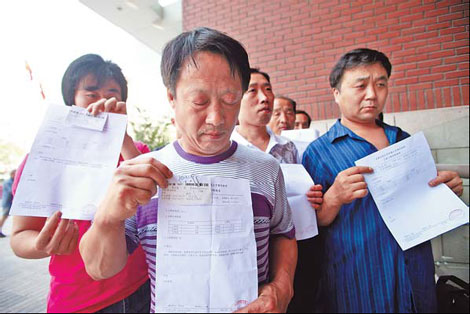Miners diagnosed with lung disease
Li Zhen, 55, was very talkative with his co-workers on Thursday morning while they were waiting for their test results at Chaoyang Hospital.
 |
|
Miners show their test results to reporters. |
He shared with METRO his memories of his hometown in Hebei province, and his two sons. He saved every penny to support the college education of one of them. He also recalled his eight-year life underground, digging up coal.
But for all his talk, he could not hide his nervousness as he awaited his test results.
His report was finally released at 1:30 pm and read "basically fine" except for "some calcium dots on his lungs".
However, many of the 50 workers with him were not so "lucky". Around 20 of them were diagnosed with pneumoconiosis, a lung disease caused by the inhalation of dust.
All of them came from Shijiaying township,Fangshan district, which, along with Mentougou district, produces an annual output of around 300,000 tons of coal from the small and private coalmines scattered in the two districts.
On May 31, the municipal government announced the closure of the last of its small coalmines. Although the closures mean there will be no further injuries or accidents to workers in these mines, the workers' nightmare may just be beginning.
A few of the laid off miners received 1,000 yuan, but most received no compensation at all when they were made redundant.
But what's worse, more than 120 of the miners have been diagnosed with pneumoconiosis since the closure of the coalmines, according to Fazhi Weekly. A number that many of the ex-miners believe will only increase as time goes by.
For nearly three years, Zhang Xianfeng, 41, sweated for 10 or more hours a day underground with very little protection in a Fuzeng Coalmine.
After being diagnosed with phase I pneumoconiosis on Thursday, he told METRO he often found it hard to breath and that he caught colds easily, and that he was getting weaker and weaker.
His wife, who used to be a full-time housewife, was now the breadwinner for the family.
"My life has been ruined," he said, with his head buried in the diagnosis report.
And there are also those who are in phase III, which means they "can do nothing, but just wait to die", he said.
Although the disease is work-related, their hope for compensation is likely to remain unfulfilled.
Because most of the mines were privately operated, it was quite common for the workers not to sign a contract or have any insurance. Even if they did sign a contract the owners usually kept the documents, Zhang said.
When the mines closed, the workers had no certificate to prove they once worked in them.
Without the certificate a hospital cannot make an occupational disease assessment report, so they cannot get compensation.
One lawyer, who is involved in helping these migrant workers, but who preferred not to be named, told METRO that there is still a long way to go before these migrant workers' rights can be safeguarded.
"The process of assessing whether the disease is occupational is controversial, because the process is very complex and takes a very long time," he said.
"And the lack of contracts and other important documents make the situation even worse."
More than 100 miners gathered to appeal to the government of Fangshan district days ago, but the officials did not reply, according to Wei Kexiang, another worker from Sichuan province.
"We are still waiting. But how long will it last?" he said.
 0
0 







Go to Forum >>0 Comments